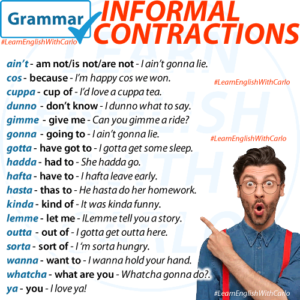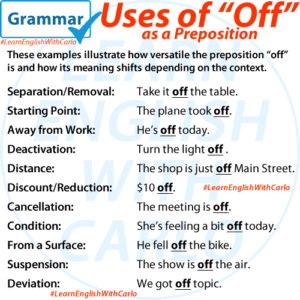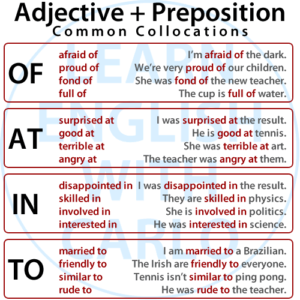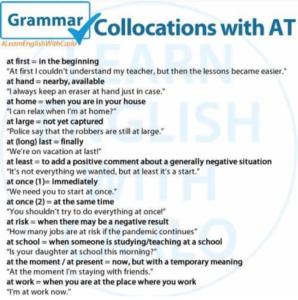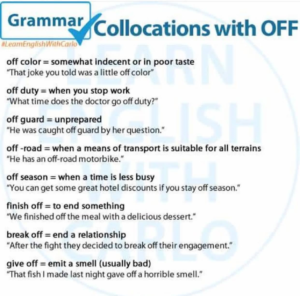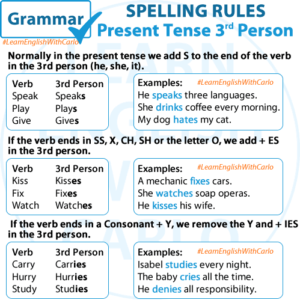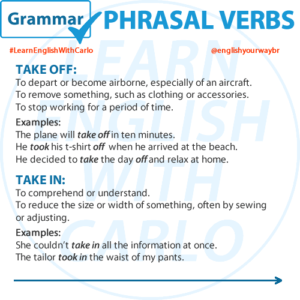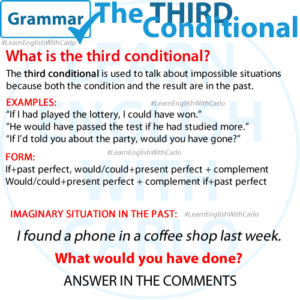VOCABULARY – Informal (spoken) Contractions In English, as in most other languages, there are ways to shorten groups of words that commonly go together. We don’t do this in writing, just when we speak. They are called informal or spoken, contractions. ain’t – am not/is not/are not – I ain’t gonna lie. cos – because …
Category: GRAMMAR
Permanent link to this article: https://englishyourway.com.br/vocabulary-informal-contractions/
May 16
Uses of “Off” as a Preposition
The preposition “off” has many different uses in English, depending on the context. Here’s a breakdown of its main uses: 1. Separation or Removal 2. Starting Point (in Time or Space) 3. Away from Work or Duty 4. Deactivation or Disconnection 5. Distance or Separation 6. Reduced or Discounted 7. Cancellation or Suspension 8. Condition …
Permanent link to this article: https://englishyourway.com.br/uses-of-off-preposition/
May 13
GRAMMAR Adjective + Preposition
Adjectives are words used to describe a person, place, or thing, for example, The tall man in the red shirt is a friend of mine. We drove along a quiet road until reaching a small town. I’m reading an interesting book. Prepositions are words used to connect two ideas or to demonstrate the relationship between …
Permanent link to this article: https://englishyourway.com.br/grammar-adjective-preposition-2/
Apr 26
GRAMMAR – Collocations with AT
The preposition “at” is used in many common expressions in English, each with unique meanings. Below, you’ll find clear explanations and examples to help you understand and use these expressions confidently. Let’s explore! 1. At First = In the beginning This expression describes the initial phase of something, often followed by a change. Examples: 2. …
Permanent link to this article: https://englishyourway.com.br/grammar-collocations-with-at/
Apr 25
GRAMMAR – Collocations with off
The English preposition “off” has a variety of meanings and uses, often forming part of idiomatic expressions and collocations. In this blog post, we’ll explore some common expressions with “off,” provide clear definitions, and share examples for each. Let’s dive in! 1. Off Color Definition: Something that is somewhat indecent, inappropriate, or in poor taste.Examples: …
Permanent link to this article: https://englishyourway.com.br/grammar-collocations-with-off/
Apr 22
Understanding SO, SUCH, and TOO in English
The words so, such, and too are often confused by English learners because they all express emphasis or intensity. However, they follow different grammatical patterns and are used in distinct ways. Let’s break it down with examples and explanations. 1. SO So is used with adjectives and adverbs to indicate a high degree, often followed …
Permanent link to this article: https://englishyourway.com.br/using-so-such-too-in-english/
Apr 10
“Used to” vs. “Be used to”
“Used to” refers to past habits or situations that are no longer true in the present.“Be used to” refers to the state of being familiar or accustomed to something in the present. Used to: “Used to” is a phrase used to describe past habits or situations that were true in the past but are no …
Permanent link to this article: https://englishyourway.com.br/used-to-vs-be-used-to/
Mar 27
Grammar Guide: Adding S to the Third Person Singular in Present Simple
In English, when using the present simple tense, verbs often change slightly in the third person singular (when the subject is he, she, or it). These changes depend on the spelling of the verb. Let’s break it down! 1. The Basic Rule: Add “S” For most verbs, simply add S to the base form: Verb …
Permanent link to this article: https://englishyourway.com.br/adding-s-to-the-third-person-singular/
Mar 09
GRAMMAR – PHRASAL VERBS with TAKE
Phrasal verbs are special phrases in English made up of a verb (like “take”) and another word (like “off” or “out”). Together, they create a new meaning that might not be obvious from the individual words. They’re really common in English and are used in all kinds of conversations. Learning phrasal verbs helps you understand …
Permanent link to this article: https://englishyourway.com.br/grammar-phrasal-verbs-with-take/
Feb 12
Conditionals – The THIRD Conditional
What is the third conditional? The Third Conditional is used to talk about hypothetical or unreal situations in the past and their imagined outcomes. It’s commonly used to express regrets, wishes, or events that didn’t happen. Examples: In each case, the situation is impossible to change because it’s already in the past. Forming the Third …
Permanent link to this article: https://englishyourway.com.br/conditionals-the-third-conditional/

